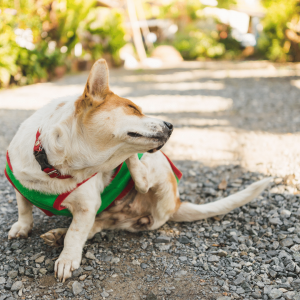Does Your Dog Have Seasonal Allergies?

Contents
Does your dog chew on his paws like they’re a tasty chicken bone? Is his constant scratching and collar jiggling keeping you up at night? How about watery eyes, skin problems, and itchy ears?
If this sounds all too familiar, there’s a good chance your dog has seasonal allergies.
Just like people, pollen and other environmental factors can trigger allergy symptoms for your best buddy. And, much like us, it’s sometimes hard to diagnose the problem. Especially since your pooch can’t tell you what the issue is. As a pet parent, it’s important that you know what to look for.
What Causes Allergies?
Understanding exactly what allergies are will be very beneficial when it comes to identifying them and giving your pup some much need relief. Allergies are sensitivities to things like food, chemicals, dust, pollen, and other things we’re exposed to in our environment.
These sensitivities cause the immune system to react to substances that would otherwise be completely harmless. Our immune system normally protects us from illness, but when you’re allergic to something, your immune system can actually work against you, and it’s no different for your dog.
The immune system responds to an allergic reaction by releasing histamines that cause itching, swelling, and inflammation. This results in the visible signs of allergies that our dogs display, including licking, scratching, red skin and ears, watery eyes, and sometimes even sneezing and coughing.
Things Your Dog Could Be Allergic To
In addition to certain foods, many things in the environment can cause seasonal allergies. These include:
- Grass
- Weeds
- Pollen
- Mold
- Fungi
According to the experts at dogsora.com, it’s also very common for dogs to be allergic to flea bites. “Most pets are allergic to their saliva sending off a whole cascade of allergic reactions and discomfort. Even if your pet is on flea prevention, they can still be bitten by a flea and common preventions can take up to 2 hours to kill them off.”
Since it can be difficult to tell the difference between seasonal allergies and food allergies, it’s always a good idea to see your veterinarian for proper diagnosis.
Are Allergies Common in Dogs?
Unfortunately, food and seasonal allergies are extremely common in dogs. So, if your dog is displaying allergy symptoms, he likely has them to some degree. In dogs, things that cause an allergic reaction don’t generally change with age. However, some breeds are more likely to suffer from allergies than others.
Common Allergy Symptoms in Dogs
As a dog owner, you’re probably all too aware of your dog’s constant chewing, licking, and scratching in an attempt to relieve allergic itchiness. Here are some other symptoms that indicate allergies:
- Sneezing
- Watery Eyes
- Runny Nose
- Congestion
- Flaky, Bumpy, or Red Skin
- Chronic Skin and Ear Infections
- Head-Shaking and Scratching at the Ears
- Dirty or stinky ears
- Hair loss
Skin Allergies in Dogs
Skin allergies are the most common type of allergic reactions dogs display and seasonal allergies are one of the main causes. Atopic dermatitis is a common skin condition that is often triggered by allergies to seasonal mold, dust, and pollen. If you notice your dog only displays allergy symptoms at certain times of the year, seasonal allergies are likely the cause.
For most dogs, the areas around the underarms, groin, eyes, ears, and paws are the most likely to be affected.
It’s important to address seasonal allergies because they can cause secondary infections, which can be a bit more serious. When a dog licks, bites, and scratches at his skin to relieve the itching, he could break the skin and allow bacteria or yeast to enter and cause an infection.
Food Allergies Vs. Seasonal Allergies
So, how can you tell if your dog is suffering from seasonal allergies or food allergies? As mentioned above, if the symptoms only display at certain times of the year, it’s probably seasonal. If the symptoms seem to continue year-round, it’s probably his food.
Keep in mind that pet food companies often change up their formulas, so even if your dog has been eating the same food for years, new ingredients could trigger a sudden reaction. Food sensitivities may also display as gastrointestinal issues, such as diarrhea.
How Your Vet Can Help Your Dog with Seasonal Allergies
Although the symptoms of seasonal, environmental, and food allergies can all be similar, your vet can run some tests to get to the bottom of the issue.
An intradermal skin test, much like the one used for humans, can pinpoint specific triggers. The method involves injecting a tiny amount of the test allergen under the dog’s skin. If swelling, hives, or redness occur at the site, the dog is allergic to that trigger.
Once armed with this knowledge, your vet can create a specialized serum just for your dog, which is injected by the vet or pet owner at specific intervals to alleviate symptoms. The vet may also recommend other treatments, depending on symptoms and triggers.
Some dogs may also require antibiotics for secondary infections and anti-inflammatory drugs for severe symptoms.

What You Can Do to Help Your Dog with Seasonal Allergies at Home
Of course, speaking to your vet should be your first priority, but there are some things you can do at home that will make a huge difference in your dog’s comfort level.
- Frequent baths with hypoallergenic oatmeal or aloe shampoo can help remove potential allergens like pollen and grass from your pet’s skin and may relieve some of the itchiness. You can also use paw wipes to clean your dog’s feet every time he comes in from outside.
- Talk to your vet about over the counter antihistamines such as Benedryl.
- Omega-3 fatty acid and probiotic supplements can reduce inflammation and other allergy symptoms.
- Pollen levels tend to be lowest in the early morning, so that’s the best time for your daily walks. Be sure to avoid tall grass and fields where pollen is likely to be more abundant.
- Change your air filters regularly to reduce airborne allergens in the home.
- Wash your dog’s bedding regularly to remove lingering allergens.
- Some pet parents swear by daily foot soaks made from one-part apple cider vinegar and two parts water for reducing itchy feet and toes.
- Coconut oil may also relieve allergy symptoms and support healthy skin.
Final Thoughts
Unfortunately, there’s really nothing you can do to prevent allergies. But there’s plenty you can do to relieve the symptoms. Identifying the underlying cause can be especially helpful when trying to avoid your dog’s allergy triggers. In many cases, changing your dog’s food or reducing his exposure to pollen and other environmental allergens can provide tremendous relief.
